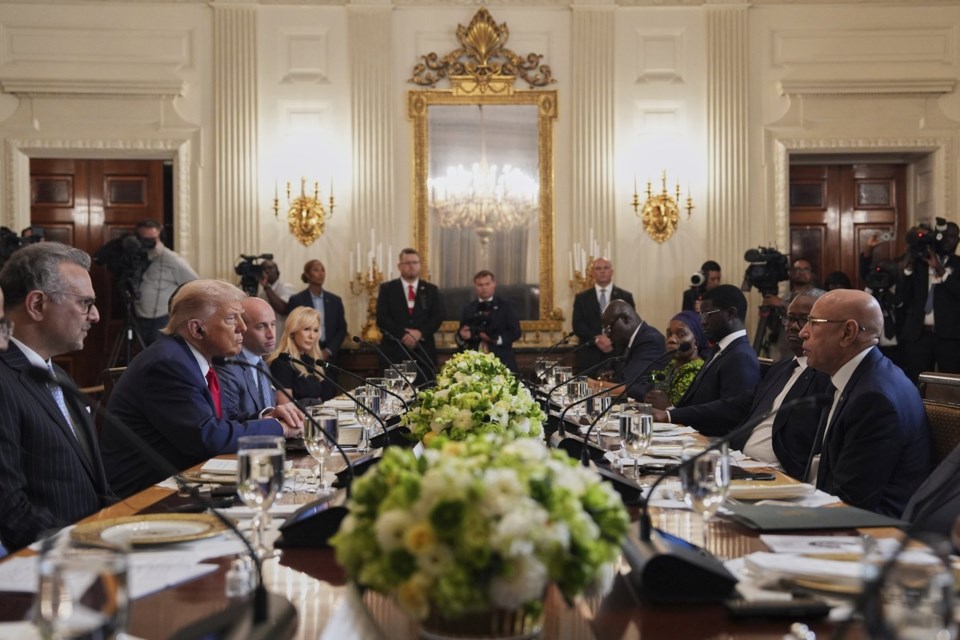HARARE, Zimbabwe (AP) — When U.S. President Donald Trump met five African leaders in Washington this month, his lack of familiarity with the continent was on display. He praised Liberian President Joseph Boakai’s English — Liberia’s official language — and gestured at another leader to wrap up remarks.
But the bigger takeaway was Trump’s pledge to transform U.S.-Africa relations: a shift from aid to trade, even as the region reels from his steep tariffs and sweeping aid cuts.
African leaders offered minerals from manganese to uranium and possibly lithium. Senegal’s president even sought to leverage Trump’s love of golf by inviting him to build a course. Yet many nations are anxious about Washington’s new path.
Here's a look at Trump's new ‘trade not aid’ policy toward African nations:
A commercial diplomacy approach
After slashing billions in foreign aid, including shutting down the U.S. Agency for International Development — which provided over $12 billion in humanitarian assistance in 2024 alone — the Trump administration says it is forging a new approach: “commercial diplomacy.” Trade, not aid, is the order of the day.
“It is now truly our policy for Africa,” said Troy Fitrell, the top U.S. diplomat for Africa, when announcing the strategy in Abidjan, Ivory Coast, in May. Ambassadors will now be judged not by aid projects but on “how well they support” local businesses and “how effectively they advocate for U.S. business and the number of deals they facilitate,” he said.
Africa accounts for less than 1% of U.S. goods trade, but Fitrell called it “the world’s largest untapped market,” projecting its purchasing power could surpass $16 trillion by 2050.
Early deals, lingering doubts
Washington touts quick progress: 33 agreements worth $6 billion in Trump’s first 100 days, plus $2.5 billion in commitments at a U.S.-Africa business summit in June. Projects span grain storage and digital infrastructure in Angola, energy ventures in Rwanda, Sierra Leone and Congo, and tourism in Ethiopia.
Still, many worry about the costs. Job losses and economic pain from tariffs are mounting even as Washington celebrates these wins.
Trump did not invent the idea of trade over aid. African leaders have pushed for this since the 1970s. The problem, critics say, is the caveat of tariffs and uncertainty over the African Growth and Opportunity Act (AGOA), the U.S. flagship program for trade with the continent.
“In reality, these tariffs are not about trade balances. It’s economic warfare,” said the Alternative Information and Development Centre, a South African NGO.
Fears that jobs could go
Trump has imposed a 30% tariff on selected South African goods and threatens another 10% for nations aligned with the BRICS bloc of developing economies. South Africa’s Automotive Business Council says vehicle exports to the U.S. have plunged over 80%, warning that tariffs “strike at the heart of South Africa’s industrialization agenda.” More than 100,000 jobs, mostly in auto and agriculture, are at risk, the council says.
Smaller nations are also reeling. Lesotho declared a state of disaster after being hit with 50% duties — the second-highest rate after China — before Trump announced a 90-day pause. About 12,000 textile jobs in Lesotho hang in the balance, according to its Minister of Trade, Industry, and Business Development, Mokhethi Shelile. From vanilla farmers in Madagascar to cocoa growers in Ivory Coast and oil exporters in Nigeria, tariffs have shaken economies and raised doubts about Washington’s intent.
“The U.S. certainly can’t have it both ways,” said Brendon Verster, an economist at Oxford Economics Africa. “The ‘aid to trade’ stance risks leaving Africa behind once the U.S. has gotten what it wanted, which will probably be critical minerals."
An agreement on the brink
AGOA, enacted in 2000 and renewed in 2015, allows duty-free U.S. access for nearly 2,000 goods from 32 African nations. It expires in September, with no clear sign that it will be renewed.
South Africa’s trade minister warned it will be “very difficult” to keep AGOA under current conditions. Fitrell said he is a “big fan” of the deal but told African leaders they must do more to lobby Congress. Future arrangements may require “much greater attention toward some form of reciprocity” to reflect Trump’s push for U.S. economic interests, he said.
Meanwhile, China is leveraging zero-tariff policies to expand its influence. In June, China — already Africa’s biggest trading partner — said it plans to grant duty-free market access to 53 African nations. Still, Verster said some African nations might be cautious about strengthening ties with China, for fear of triggering retaliation from the U.S.
“Aligning with China … could possibly bring about more economic punishment from the U.S.," he said.
___
This story has been corrected to show that the U.S. Agency for International Development provided over $12 billion in humanitarian assistance in 2024, not 2025.
Farai Mutsaka, The Associated Press



